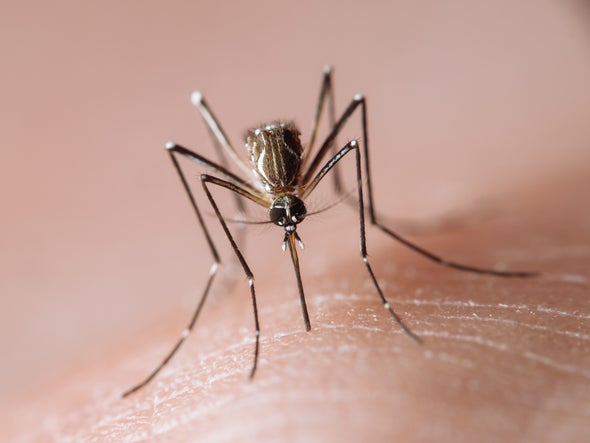(单词翻译:单击)
听力文本
This is Scientific American's 60-second Science, I'm Christopher Intagliata.
It might seem obvious that the primary function of insect repellents like DEET is to, well, repel. But if you bring a pipette tip full of DEET right up to a mosquito, as Johns Hopkins neuroscientist Chris Potter did:
"She just ignores it. So that really does demonstrate that DEET by itself is not repellent, and it's not going to make them fly away."
Potter's team also genetically engineered Anopheles mosquitoes to make their antennae light up when their olfactory neurons picked up on a scent. But when they spritzed the antennae with DEET and other so-called repellents, even at 100 percent strength:
"There just was no response. So that was a surprise to us. Just going into this, we thought, 'Okay, they're insect repellents. They're going to activate neurons; that's how they repel mosquitoes.' So then the question is, 'What are they actually doing?'"

The researchers kept experimenting with those genetically modified mosquitoes to find out. A whiff of molecules commonly found on human skin made the mosquitoes' antennae light up like a Christmas tree, Potter says. So they do sense us, which you've likely experienced. But when they combined compounds from our natural human perfume with DEET and other synthetic repellents, the antennae just flickered dimly.
"So these odors, which, before, would strongly activate the olfactory system, essentially now didn't do anything."
Meaning repellents like DEET actually act like an invisibility cloak against mosquitoes. The details are in the journal Current Biology.
Natural repellents, on the other hand, like lemongrass oil, strongly activated the skeeter's senses in a negative way. And they weren't as affected by masking chemicals like DEET. So the scientists say maybe you could combine them—to both offend the mosquitoes' senses and to mask the more irresistible scent—of you.
Thanks for listening for Scientific American's 60-second Science. I'm Christopher Intagliata.
参考译文
这里是科学美国人——60秒科学系列,我是克里斯托弗·因塔格里塔。
显而易见,避蚊胺等驱蚊剂的主要功能是驱蚊。但如果你像约翰霍普金斯大学的神经学家克里斯·波特那样,将装满避蚊胺的吸管直接放到蚊子面前:
“蚊子会无视它。因此,这确实证明避蚊胺本身并不是驱蚊剂,不会将蚊子赶走。”
波特的团队还对按蚊进行了基因改造,使其嗅觉神经元嗅到气味时触须会发光。但当他们用避蚊胺和其他所谓的合成“驱蚊剂”喷洒触须时,即便浓度为100%:
“蚊子也没有任何反应。这令我们相当吃惊。一开始我们认为:这些是驱蚊剂。它们会通过激活神经元的方式来驱蚊。然后问题就变成,‘它们到底是如何做到的?’”
为了找到答案,研究人员一直用这些经过基因改造的蚊子进行实验。波特表示,人类皮肤上常见的一些气味使蚊子的触须像圣诞树一样亮了起来。因此,蚊子的确感觉到了我们,你可能也经历过。但是,当他们将自然人类气味化合物与避蚊胺和其他合成驱蚊剂混合在一起时,蚊子的触须只会微弱地闪烁。
“所以,这些以前会强烈激活嗅觉系统的气味现在基本上没有任何作用。”
意思是,避蚊胺等驱蚊剂就像对付蚊子的隐形斗篷。研究详情发表在《当代生物学》期刊上。
另一方面,柠檬草油等天然驱蚊剂,会以负面方式强烈地激活蚊子的感官。这些驱蚊剂不会受到避蚊剂胺等掩饰化学物质的影响。因此,科学家表示,也许你可以将它们结合起来——既能刺激蚊子的感官,又能掩盖你身上那更诱人的气味。
谢谢大家收听科学美国人——60秒科学。我是克里斯托弗·因塔利亚塔。
译文为可可英语翻译,未经授权请勿转载!
重点讲解
重点讲解:
1. be full of 有大量…的;满是…的;
The pool had dried up and was full of bracken and reeds.
水塘已经干涸,里面都是欧洲蕨和芦苇。
2. light up 照亮;发亮;
There was an explosion and the whole sky lit up.
一声爆炸照亮了整个天空。
3. pick up 发现,找到,识别;
Scientists have known for decades that male lab mice produce high-frequency sounds — when they pick up the scent of a female mouse .
几十年前科学家们就知道,当实验室中的雄性老鼠闻到雌性老鼠的气味时,会发出高频率的声音。
4. a whiff of 一阵(气味);
He caught a whiff of her perfume.
他闻到了她身上的一股香水味。


